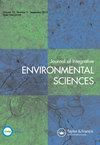Substitution, natural capital and sustainability
IF 3.5
4区 环境科学与生态学
Q3 ENVIRONMENTAL SCIENCES
Journal of Integrative Environmental Sciences
Pub Date : 2021-01-01
DOI:10.1080/1943815X.2021.2007133
引用次数: 2
Abstract
ABSTRACT Substitutability of natural capital by human-made capital would seem to be limited. When human-made capital substitutes natural capital, there are currently commonly long-lasting negative impacts of such substitutions on constituents of natural capital. Long-lasting negative impacts on natural capital can be considered at variance with justice between the generations. In view thereof, there is a case to define (environmental) sustainability as keeping natural capital intact for transferral to future generations. A major problem for such conservation regards natural resources generated by geological processes (virtually non-renewable resources), especially regarding geochemically scarce elements. Substitution of virtually non-renewable resources by generating equal amounts of renewables has been proposed as a way to conserve natural capital. However, renewables substituting for fossil carbon compounds are currently associated with negative impacts on constituents of natural capital to be transferred to future generations. The same holds for the substitution of widely used geochemically scarce virtually non-renewable copper by abundant resources generated by geological processes. Though current negative impacts of substitutions on natural capital can be substantially reduced, their elimination seems beyond the scope of what can be achieved in the near future. The less strict “safe operating space for humanity”, which has been used in “absolute sustainability assessments” is, however, not a proper alternative to keeping natural capital intact for transferral to future generations.替代、自然资本和可持续性
人为资本对自然资本的可替代性似乎是有限的。目前,当人工资本替代自然资本时,这种替代对自然资本的组成部分普遍存在长期的负面影响。对自然资本的长期负面影响可以被认为与代际之间的正义不一致。鉴于此,有理由将(环境)可持续性定义为保持自然资本完好无损以便转让给后代。这种保护的一个主要问题是地质过程产生的自然资源(实际上是不可再生的资源),特别是地球化学上稀缺的元素。通过生产等量的可再生能源来替代几乎不可再生的资源,已被提议作为保护自然资本的一种方式。然而,替代化石碳化合物的可再生能源目前对自然资本的成分产生了负面影响,这些成分将转移给子孙后代。这同样适用于用地质过程产生的丰富资源取代广泛使用的地球化学上稀缺的几乎不可再生的铜。虽然目前替代对自然资本的负面影响可以大大减少,但消除它们似乎超出了在不久的将来可以实现的范围。然而,在“绝对可持续性评估”中使用的不那么严格的“人类安全操作空间”,并不是保持自然资本完整地转移给子孙后代的合适选择。
本文章由计算机程序翻译,如有差异,请以英文原文为准。
求助全文
约1分钟内获得全文
求助全文
来源期刊

Journal of Integrative Environmental Sciences
ENVIRONMENTAL SCIENCES-
CiteScore
3.90
自引率
0.00%
发文量
13
审稿时长
>12 weeks
期刊介绍:
Journal of Integrative Environmental Sciences (JIES) provides a stimulating, informative and critical forum for intellectual debate on significant environmental issues. It brings together perspectives from a wide range of disciplines and methodologies in both the social and natural sciences in an effort to develop integrative knowledge about the processes responsible for environmental change. The Journal is especially concerned with the relationships between science, society and policy and one of its key aims is to advance understanding of the theory and practice of sustainable development.
 求助内容:
求助内容: 应助结果提醒方式:
应助结果提醒方式:


